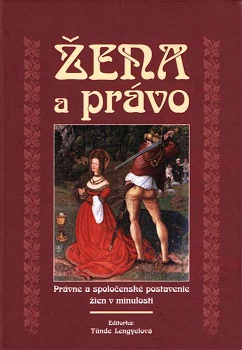Hospodárenie - netradičná úloha aristokratických žien v ranonovovekom Uhorsku
Estate management as an unusual occupation of Noble women in Hungary in the early modern period
Author(s): Várkonyi Gábor
Subject(s): Gender Studies, Modern Age, Culture and social structure
Published by: SAV - Slovenská akadémia vied - Historický ústav SAV
Keywords: early modern period; Hungary; estate management; noble women;
Summary/Abstract: There have been few stereotypes in Hungarian historiography concerning the period of the Ottoman occupation or early modern period dating that originated mostly in the 19th century. Farkas Deák was one of the first historians who realized the importance of the sources for history of women and started using them. He published women's correspondence and wrote their biographies. He attempted to portray Hungarian aristocratic women as perfect faithful wives, loving and caring mothers, diligent housewives, good Christians and educated persons. This image is however the embodiment of an ideal woman from the author's times, that is the second half of the 19th century. In fact, the image was already archaic in the times when it was created. The author analyses and illustrates the notion of a 'diligent housewife' on the background of the social situation of the 17th century. Is it not an anachronism to talk about housewives in connection with aristocracy? The basic problem is to define the contents of the term 'women’s work’. Whereas the 'men’s work' is well defined and framed in time and space (e.g, politics or military service has concrete meaning), it is difficult to find a definition for 'women's work'. Women's work is something that men do not do. To simplify it, we can say that women's sphere is the family, household and child bearing.The archbishop of Esztergom Peter Pázmány, a great figure of the Catholic reform in the 17th century paid a special attention to education of Christian girls in his collection of sermons. Girls were supposed to learn how to spin, weave, embroider, tie nets, and lead a good, honest and useful life. The women were expected to sit at home, talk to God and - as a sign of their gratitude - to cook tasty dishes for their husbands. Other authors expressed the same opinion about house-hold duties as the proper occupation for women. Apart from the Pázmány‘s writings, there were other works dealing with education of girls and behaviour of women, for instance “Horologii principium” by Antonio Guevara published in Graz in 1610. A typical example of aristocratic estates managing women was Elizabeth Báthory. She was in charge of the Nádasdy‘s estates and when she defied some maltreatment of their property, she was just doing what contemporaries expected a woman in her position to do. She administered the estates and the household, protected the property of her late husband and took care of her subjects. Elizabeth Rákoczi, though not a widow as Elizabeth Báthory, was often left alone in charge of the family estates. She did not have a special training in estates management, but her education, practicality and experience made her an efficient manager. She was acquainted with inventories and tolls and was even familiar with efficient technological methods for agricultural production. In order to evaluate and analyse economic abilities and competence of Hungarian aristocratic women in the 17th century, more comparative case studies would be needed.
Book: Žena a právo. Právne a spoločenské postavenie žien v minulosti
- Page Range: 177-184
- Page Count: 8
- Publication Year: 2004
- Language: Slovak
- Content File-PDF

